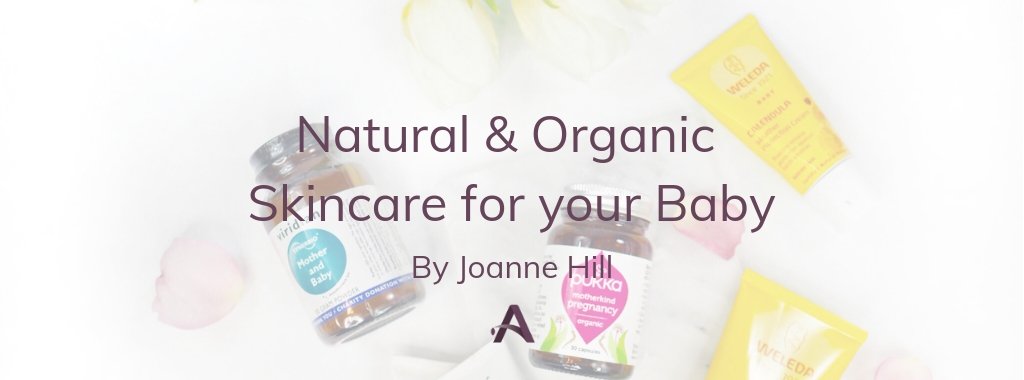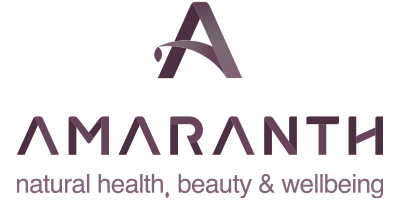Natural and Organic Skincare for your Baby

Why Choose Natural and Organic Skincare for your Baby?
Every parent wants the best for their baby and we know from our discussions at Amaranth that we spend a lot time considering the foods and nutrients to introduce to our babies. In our experience however, less time is spent considering the ingredients contained within the products that are used on babies skin.
We know from our research that products applied onto the skin can be absorbed through the skin. Did you know that babies skin is thinner than adult skin (about 20 to 30% thinner) and that they have less fat stores under the skin? This means that it easier for skincare ingredients to penetrate the skin and reach the bloodstream in babies and infants. Furthermore, compared to adults, babies have a greater surface area relative to weight and immature detoxification pathways. Their bodies are not yet used to processing foreign ingredients and passing them through the system as waste.
The skincare market, is awash with ‘greenwashing’. Greenwashing is the action of making a product appear as natural or organic by highlighting the plant ingredients the product contains, despite the fact the product also contains an array of chemical ingredients. Some of these chemicals have been linked to harmful effects or skincare reactions.
Marketing can lead us to believe that we need a whole host of products to keep our babies skin soft and clean, usually this is incorrect. Infant skin has been found to absorb more water but also lose excess water faster than adult skin. That means that where skincare is concerned, it is important to steer clear of ingredients that can strip the skin. We want our babies to be clean but they don’t need to be squeaky clean. Mild natural soaps for cleansing and natural oils are usually the only products that you need. Natural oils will help to preserve the water content in the skin, the benefits of applying natural oils as an emollient and to preserve water loss has been proven with premature infants. In a randomized, controlled trial, massaging premature infants with sunflower seed oil three times daily resulted in a 41% reduction in sepsis and a 26% reduction in mortality.[1]
The minefield of information, marketing and not forgetting the free samples handed out by cosmetic and pharmaceutical companies can make it very difficult to know which products to choose. Our advice is to check the labels. Here is our list of the top things to avoid when it comes to your babies (and your skincare).
Parfum or Fragrance. In our view, any fragrance other that those naturally occurring from plants or oils, do not have a role in babies skincare products. Parfum from undisclosed sources are given a red (hazardous) rating on the Environmental Working Group (EWG) Skin Deep database. According to the EWG:
The word "fragrance" or "parfum" on the product label represents an undisclosed mixture of various scent chemicals and ingredients used as fragrance dispersants such as diethyl phthalate. Fragrance mixes have been associated with allergies, dermatitis, respiratory distress and potential effects on the reproductive system[2]
Parabens:
Parabens are the most commonly used preservative in skincare. Parabens are permitted in the EU but only at certain levels as concerns have been raised over their safety. Parabens appear less now in products formulated for babies and children as the public are more aware of the concerns, it is however always worth checking the labels. Other names for parabens you may find on the labels are Ethylparaben, butylparaben, methylparaben, propylparaben, isobutylparaben, isopropylparaben, other ingredients ending in –paraben, para-hydroxybenzoic acid
Mineral Oils:
Mineral oils are inexpensive by-products of petroleum which are commonly used as an emulsifier and a moisturiser. They effectively act as a barrier which can be helpful for keeping the water content in the skin but they may also block the skin and prevent it from its normal function of absorbing nutrients and moisture. Mineral oils are often labelled as Paraffinum Liquidum, dipropylene glycol, butylene glycol
Methylisothiazolinone (MI):
MI is preserving and sanitising agent which is widely recognised as a common skin irritant. MI is banned for use in leave in products and we haven’t found any in the specific baby formulated products we have looked at but do be aware, particularly if you use products for the whole family on your baby. Look out for Methylchloroisothiazolinone, Methylisothiazolinone, MCI, MI
Triclosan:
Triclosan is an anti bacterial agent used in toothpastes, soaps and deodorants. It has been banned for use in the US as it has not been proven to be safe or have any benefits so this is definitely an ingredient to avoid in products used on babies and children.
Sodium hydroxymethylglycinate:
Sodium hydroxymethylglycinate is an antimicrobial preservative that works by forming formaldehyde in cosmetic products. People exposed to such formaldehyde-releasing ingredients may develop a formaldehyde allergy or an allergy to the ingredient itself.
Sulfates/Sodium Lauyl Sulphate (SLS)
These commonly used foaming agents and emulsifiers help the skin feel squeaky clean and they are often found in infant body washes, soaps and shampoos. SLS can cause skin and eye irritation and should definitely be avoided in skin prone to eczema and dermatitis. Look out for Sodium Lauryl Sulphate, Sodium Laureth Sulfate, SLS, SLES, Sodium dodecyl sulphate, Dodecyl sodium sulphate, SLS, Lauryl sodium sulphate, Sodium laurylsulphate, Sodium lauryl sulfate, Sulphuric acid monododecyl ester sodium salt
Our advice on Sun Protection for babies
Sun protection is extremely important for babies and infants as younger skin is more susceptible to damage. Childhood is believed to be a time of high risk for long-term harmful effects of UV, it has been found that the incidence of skin cancer is much higher in people who move from high to low latitudes as a child against those that move as an adult [3].
Effective UV radiation protection from childhood is necessary to control both immediate and long-term harmful effects on children’s skin. Whilst sun protection is important however, the type of sun creams you apply to your infant should also be carefully considered. Most commercial sunscreens contain oxybenzone which has been found to absorb through the skin in significant amounts. It has been associated with cellular level changes and hormone disruption[4]. Mineral based sun creams such as those by Green People, and Badger (both appear in the top 5 rated sunscreens by Ethical Consumer) are a natural alternative although it should be noted that some mineral based creams contain nano particles. Under normal circumstances nano particles (tiny particles that can penetrate the skin) are not recommended but the conclusion of advice from research by Ethical Consumer is that in the case of sun creams, the benefits of mineral suns creams out way the use of nano particles.
It is important to remember to minimise exposure to the sun by keeping babies covered by clothing and shade. There is no perfect sun protection for babies so only use during sun exposure do not use as a general moisturiser.
Baby Skin Conditions
Eczema and Dermatitis
It is estimated that 20% of babies and infants have atopic dermatitis and/or eczema. Reasons for this are unclear but there may be several factors at play including immune system reactions (especially in those with a history of atopic conditions), the use of known irritants in skincare and the fact that babies loose water through the skin at a great rate.
Our advice for eczema and dermatitis :
- Steer clear of any products containing parfum (unless from natural origin) and sodium lauryl sulphate. Keep products as simple as possible and always with only natural ingredients. We love the White Mallow Range by Weleda
- A natural seed oil should help to keep moisture in the skin without the pore clogging effects of paraffin based products. Weleda Calendula Baby oil contains only sesame seed oil and calendula flower extract.
- If you have a family history of atopic conditions or your baby has had antibiotic exposure (either through breastfeeding or given directly to your baby), a probiotic supplement such as Viridian Mother and Baby powder may be helpful.
Cradle Cap
Cradle cap is a fairly common condition where the baby develops greasy patches on the scalp which develop yellow crusts. The condition is harmless and will go away but there are some things you can do to help soothe the condition. We recommend a simple natural oil to massage into the skin and soften the patches (Weleda Calendula Baby oil is perfect for this) and a very gentle oil based soap such as Dr Bronner Baby Unscented Pure Castile Soap.
Baby Acne
Baby acne may be caused by hormone levels towards the end of pregnancy, it is a temporary condition and will clear up although this could take a few days to a few months. If your baby suffers with baby acne you should avoid using paraffin based emollients, these can clog the skin and may interfere with healing. You should also avoid using acne washes formulated for adults or products containing SLS, these are too harsh for babies skin. Products with natural oils and a small amount of healing ingredients such as lavender and calendula may help. Salcura Bioskin Junior nourishing spray is a product we recommend. A probiotic such as Viridian Mother and Baby may also be helpful.
If you would like more advice please contact the team at Amaranth on 0161 439 9856, email hello@amaranth-wellbeing.com or call in to see us at 19 Bramhall Lane South, Bramhall.
References:
1. LeFevre A, Shillcutt SD, Saha SK, et al. Cost-effectiveness of skin-barrier-enhancing emollients among preterm infants in Bangladesh. Bull World Health Organ. 2010;88(2):104-112 https://www.who.int/bulletin/volumes/88/2/08-058230.pdf
2. EWG Skin Deep Database
https://www.ewg.org/skindeep/ingredient/702512/FRAGRANCE/
3. Green A, Wallingford S, McBride P. Childhood exposure to ultraviolet radiation and harmful skin effects: Epidemiological evidence https://www.ncbi.nlm.nih.gov/pmc/articles/PMC3409870/
4. Jiang R, Roberts MS, Collins DM, Benson HA. Absorption of sunscreens across human skin: an evaluation of commercial products for children and adults. Br J Clin Pharmacol. 1999:48(4):635-637
At Amaranth we are passionate about natural and organic skincare. We have researched the chemicals that are used in the majority of products available and we do not want these on our skin. We believe that it is even more important that babies are not exposed to these chemical ingredients. With their thinner skin and immature detoxification pathways babies will absorb skincare and may be less efficient at processing the ingredients. Read on to find out more about natural and organic skincare for your baby.
